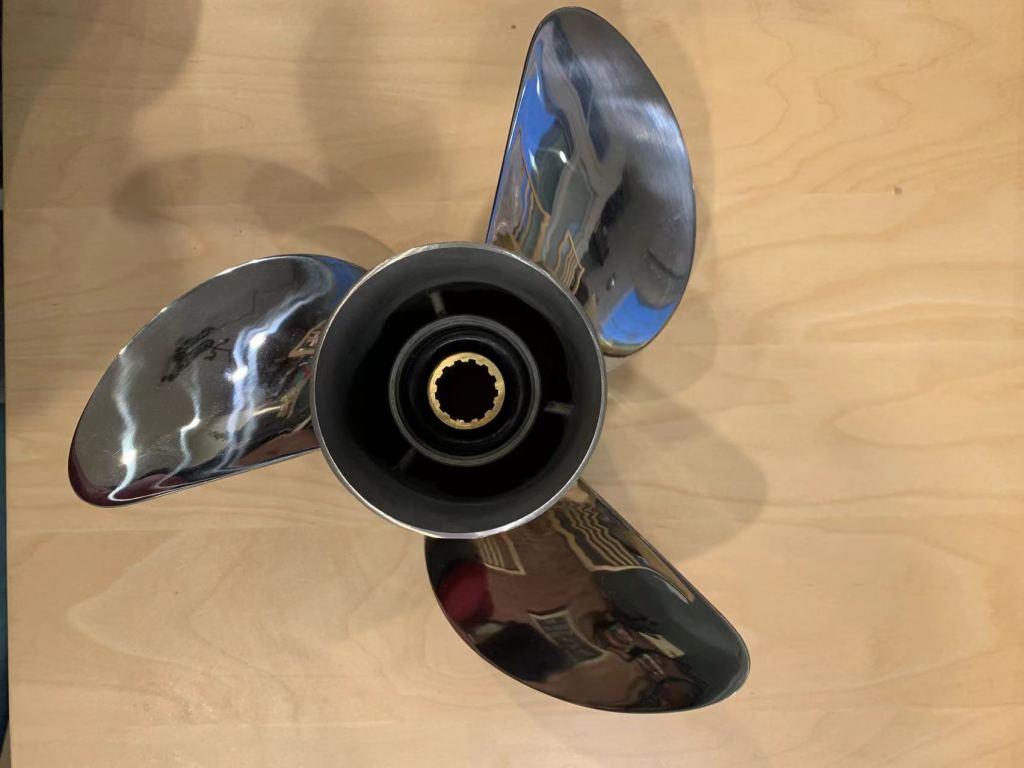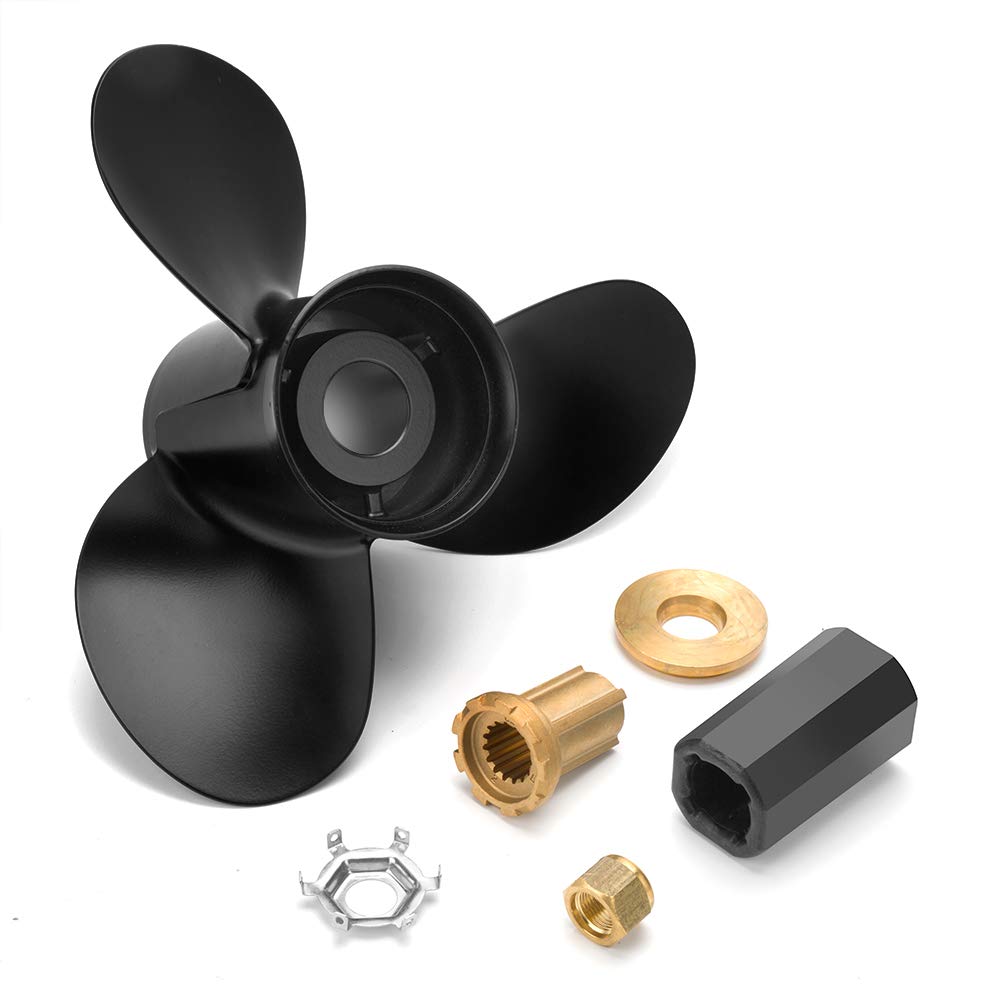If you want to avoid running aground at sea, you must know how and when your propeller needs to be replaced or repaired. This article describes situations where you may need to replace a propeller.
1:When your propeller damaged blades
2:When you find that your fuel consumption has suddenly increased
3:Hit the rock or sandbar
4:Choose the wrong diameter propeller
5:The speed suddenly slows down
6:The Sound Is Abnormal
7:Often driven in seawater and the propellers are corroded
8:The boat shakes while driving
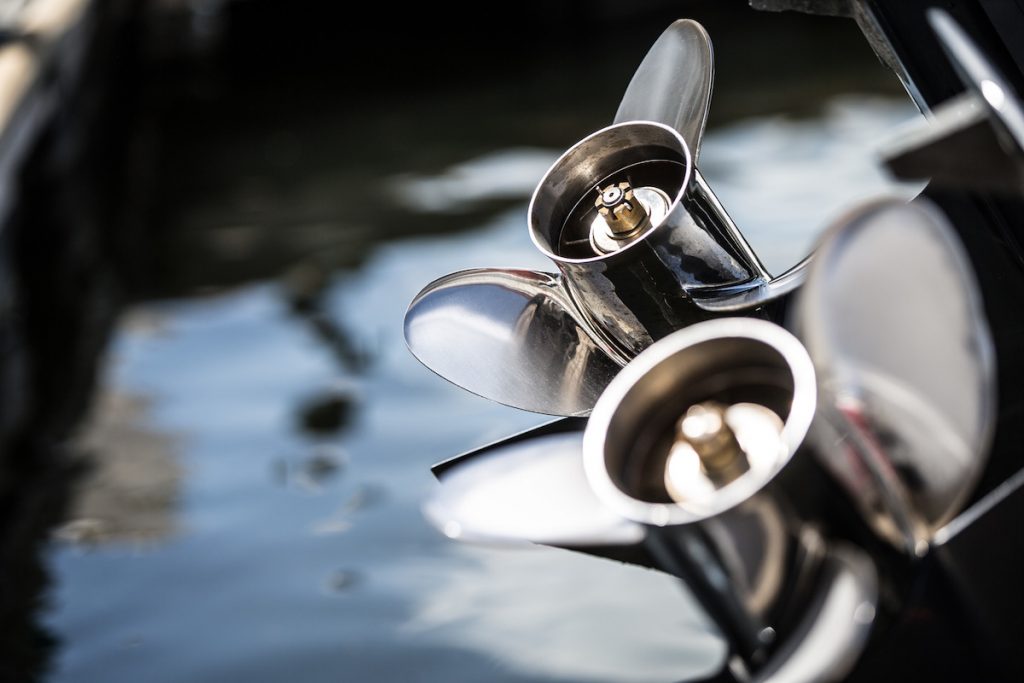
1:Damaged Blades
You need to check your propeller before each departure. If you find any scratches, breaks, or dents in the blades, you can make simple repairs as long as they are not too severe. If the propeller is badly broken, it needs to be replaced with a new propeller.
When the blades are bent, this also needs to be repaired or replaced, but bent blades are more difficult to detect so you need to check carefully before you set off.
2:Fuel Consumption Increase
When you have damage to your propeller, fuel consumption may increase. When you find that you need to refuel more often, it may be that your propeller has damage that is affecting its efficiency. For your safety as well as to save money, you should buy a new propeller.
3:Contact With Rock Or Sandbar
Suffering a bent propeller blade can happen over time with normal wear and tear, but underwater impacts can also cause them.Every time you go out to sea, you may hit rocks, sandbars, or other hard objects after you hear the sound of a collision.
Very unfortunately, you may need to replace your propeller. The impact of the collision may damage your propeller or bend it.
This problem can affect your boat’s performance and increase the likelihood of a damaged motor. Depending on the degree to which your propeller is damaged, motor repairs could cost hundreds or even thousands of dollars and affect your boat’s performance in the future. When you run your boat with a bent blade on the propeller, you could cause significant harm to the gearing within the lower unit.
4:Wrong Diameter Propeller Selected
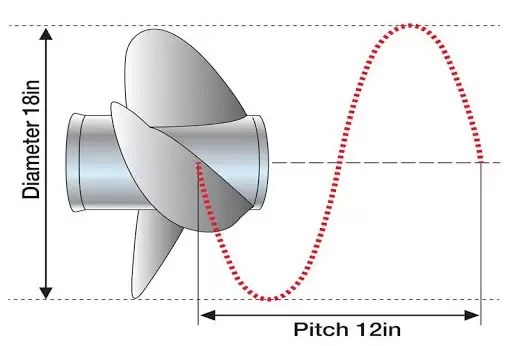
The diameter of your boat propeller is how long it measures from the tip of one blade, straight across to the tip of an opposite blade (or where a blade tip would be). Easiest way to figure out is two times the distance from the center of the hub to the tip of any blade.
You figure out what propeller diameter you need mainly by the RPM at which the propeller will be turning and the amount of power that will be needed.
With the exception of high speed (35+ knots) vehicles, the diameter of the prop is proportional to propeller efficiency (higher diameter equals more efficiency). For most vessels, a small increase in diameter means a dramatic increase in thrust and torque. In higher speed vessels like mentioned above, however, a larger diameter equates to high drag.
Diameter generally increases for props on slower boats and decreases on faster boats.
If you don’t know the correct propeller size or have purchased a propeller of the wrong size because you don’t have the help of a professional manufacturer. Then you may need to get a new propeller.
Pitch and diameter are very important parameters when buying a propeller, and only the right size will ensure your safety and efficiency.
5:Speed Slowed Down
A damaged propeller will reduce the maximum speed. The more severe the damage, the more noticeable the speed reduction will be. When you feel your boat’s speed dropping, chances are the propeller is damaged.
6:Too Much Pitch Or Not Enough Pitch
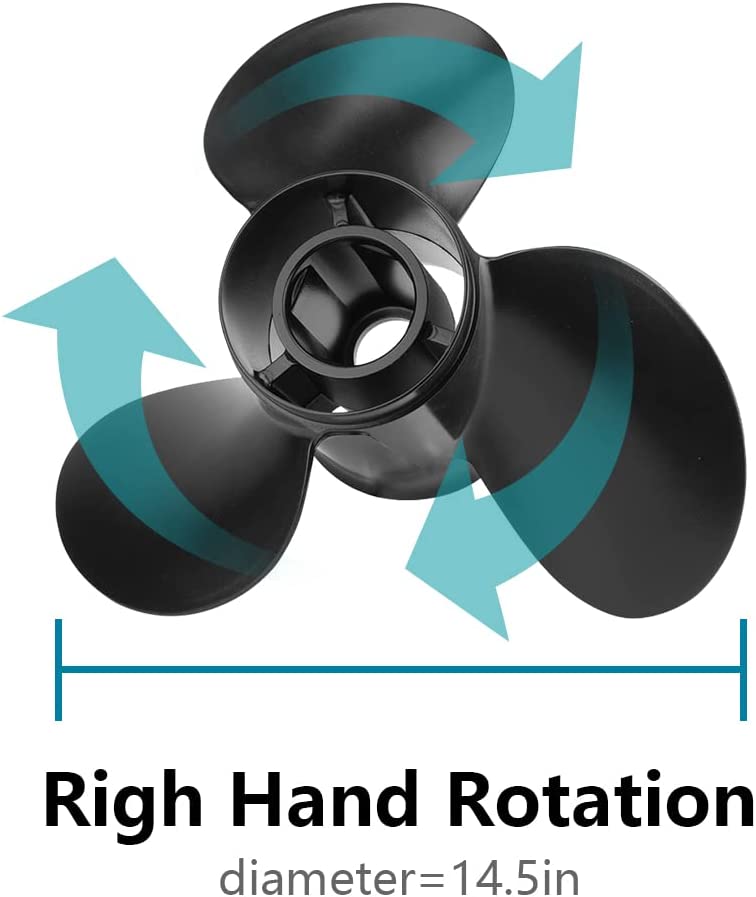
The propeller pitch is the distance that a propeller would move in one revolution if it were moving through a soft solid, like a screw through wood. It indicates the distance that a propeller would “drive forward” in each complete rotation.
For instance, a prop that moves forward 21 inches in one revolution is said to have a 21 inch nominal pitch.
If the pitch of the propeller is too small, the engine may run beyond the required WOT (wide-open throttle). Rpm, resulting in engine damage or the engine protecting itself with a rev limiter.
If the propeller pitch is too large, the engine may run below the WOT (wide-open throttle) range, that is “dragging the engine,” which also puts undue stress on the engine and gearbox components.
Long-term use can cause damage to the engine, so you will need to replace the propeller with a suitable one.
7:The Ship Rocked During the Journey
A damaged propeller can make your boat lurch. However, if the propeller damage is minimal, you may not notice it, but that doesn’t mean it’s not a problem. If your boat is not running smoothly, the blades of the propeller may be warped or dented.
The boat is lurching because the water is not sliding smoothly over a dented or damaged propeller, which can put undue stress on your shaft, lower unit, and leveling blade hardware.
8:Propeller Corrosion Due to Frequent Driving in Seawater
If you notice corrosion of the propeller or white calcium deposits. Then you may need to replace your propeller.
When the propeller is immersed in seawater, electrolytic corrosion may occur.
If you only occasionally use your boat. It is OK to use aluminum propellers. Because the price of aluminum propellers is much lower than stainless steel propellers. But if you often sail your boat, I suggest you use stainless steel propeller because it is not easy to be corrode and more durable.
If you want higher speed, you also need to change to a stainless steel propeller because the blades of stainless steel propeller are thinner. Even with the same engine, if you replace the aluminum propeller with a stainless steel one. The boat will have a higher speed, and the stainless steel propeller is not easily damaged at high speeds.
Many people choose to go out in saltwater bodies where they want to fish or dive. But salt water has a corrosive effect on propellers and can cause dents in the propeller blades. Salt water acts as an electrolyte and may damage the propeller completely.
And the salt water may also have barnacles, a marine life parasite on the propeller. That’s why we have to clean the propeller every time we come back.
Conclusion about When to Replace Boat Propeller
Visible Damage: Inspect the propeller regularly for any visible signs of damage, such as bent, cracked, or chipped blades. If you notice significant damage, it’s generally advisable to replace the propeller rather than attempting repairs.
Performance Issues: Pay attention to the boat’s performance while underway. If you notice a decrease in speed, difficulty reaching or maintaining RPM (revolutions per minute), poor handling, excessive vibrations, or difficulty getting on plane, it could be an indication of a propeller problem. In such cases, it’s worth considering a replacement.
Excessive Wear: Over time, propellers can experience wear and tear due to regular use, contact with debris, or even cavitation. Excessive wear can lead to reduced performance and efficiency. If you observe significant wear on the propeller blades, it may be time for a replacement.
Corrosion and Pitting: Propellers made of materials like aluminum or stainless steel can suffer from corrosion and pitting, especially if used in saltwater. Inspect the propeller for signs of corrosion, such as rough surfaces, discoloration, or pitting. Severe corrosion can compromise the propeller’s performance and structural integrity, necessitating replacement.
Changes in Boating Conditions: If you’ve recently changed your boating habits, such as upgrading to a more powerful engine or operating in different water conditions, it might be necessary to replace the propeller to optimize performance. For example, if you’ve increased the engine’s horsepower, you might need a propeller with a different pitch to match the new power level.
Maintenance History: Consider the propeller’s maintenance history. If you’ve been regularly inspecting and maintaining it, the lifespan can be extended. However, if it has undergone numerous repairs or has a history of damage, it may be prudent to replace it rather than risk further issues.
FAQ about When to Replace Boat Propeller
Q:Do boat propellers wear out?
A:Of course, propellers wear out. Whether it is an aluminum propeller or a stainless steel one, they will all deteriorate over time. If you run your boat in salt water a lot then this will also corrode the propeller blades and eventually there will be a hole in the metal to the point where you will have to replace it with a new propeller.
Q:I just met a guy who uses a cryogenic freezer for anything they can get their hands on, is this process good for propellers?
A:Very interesting. One can use this process on new propellers to relieve stress, but on used propellers they have to be in good condition. Need to magnetize the other two propellers to see if there are any cracks, if not, that can be done.
Q:Should I Repair Or Buy A New Boat Propeller ?
A:Stainless steel propellers are recommended to be replaced directly with new ones.Most small dents or bends in aluminum propellers can be repaired at a relatively low cost. If you do repair them, make sure the repair shop does not file off the edges of the blades, thereby reducing the diameter. If your damage includes nibbles or chunks in the blades, you should consider a new propeller.

